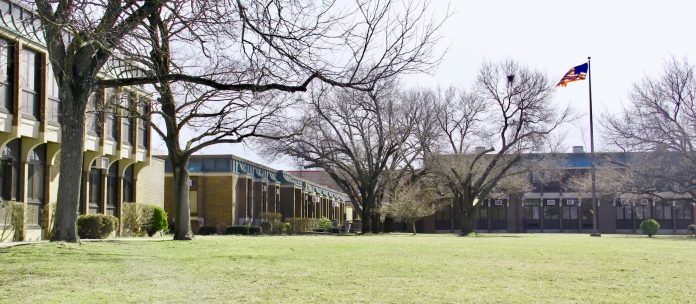A petition calling on school district officials to revise or remove the intersectionality unit in the Pathways to Racial Literacy curriculum has been submitted to the Princeton Public Schools Board of Education.
The petition, which was signed by 67 people, was presented to the school board at its March 18 meeting. Many of the signers are Chinese immigrants and are parents of students in the school district.
The signers have taken aim at the “Intersectionality, Privilege and Microaggressions” unit in the Pathways to Racial Literacy course at the Princeton Middle School. It is a mandatory course that is taught by HiTOPS staff.
The signers pointed specifically to an activity in one of the lesson plans that asks students to identify and acknowledge their own privilege or oppressor status. It reminds them of the divisiveness of the Cultural Revolution in China in the 1960s.
One of the slides in the course offers “two sides of the identity coin” – privilege and oppression.
Privilege is a special right or advantage available only to a particular person or group, the slide states. It is defined as an advantage that often goes unnoticed, and that is involuntary or out of one’s control.
It usually comes because the person who is perceived to be privileged is part of a dominant group, such as native English speakers in the United States, the slide states. With privilege comes power.
Oppression occurs or results when a person or group of people who have privilege use it in a way that is not fair, unjust or cruel, the slide states. It is a disadvantage, involuntary and beyond one’s control.
It is the result of being part of a non-dominant group. Disempowerment may come with oppression, the slide states.
The HiTOPS slides also address bias, which is associating people with stereotypes, and microaggressions. It is unconscious and out of one’s awareness.
Microaggressions are spoken and unspoken offenses against people from a non-dominant group, the slide said. It flows from the dominant group to the non-dominant group.
The petition states that the combination of oppressed/oppressor and critical race theories in the HiTOPS curriculum – drawn from Marxist thought – recalls the extreme ideologies that ignited the Cultural Revolution in China.
The Cultural Revolution began in 1966 under Communist Party leader Mao Zedong, according to www.history.org. It pitted one group against another – students in the paramilitary Red Guards against members of China’s elderly and intellectual population, www.history.org said.
The HiTOPS lesson plan that asks students to divide themselves into oppressor and oppressed categories mirrors the Cultural Revolution’s “struggle sessions,” the petition states. People were forced to place themselves in the categories of oppressor or oppressed, and subjected to public shaming.
“Please note the resemblance of this categorization method to the charts used in the HiTOPS slides. Such historical practices had detrimental effects on individuals and societies, fostering division and psychological trauma,” the petition states.
Junglien Chen, who presented the petition to the school board, said all Chinese immigrants who live in Princeton had navigated an educational system in China where Marxist ideology was not only studied, but it was a foundational pillar.
The Chinese immigrants understand Marxism’s tenets, methodologies and implications, Chen said.
“They recognize echoes of those ideologies in the HiTOPS intersectionality coursework – but with a modern twist,” he said. “Instead of focusing on class struggle, the modern adaptations use identity politics – including race and gender – as tools to challenge and destabilize traditional society structures to pave the way for a new, purportedly world.
“To us, attempts to modify or ‘beautify’ these ideologies are akin to putting lipstick on a pig. We can identify the essence of Marxism within these modern frameworks, regardless of how they are dressed up or nuanced.”
Chen said the petition signers are not dismissing the intent or value of academic exploration. They are cautioning against the uncritical adoption of any ideology to be taught in school without examining its origins, intentions and potential negative impacts.

